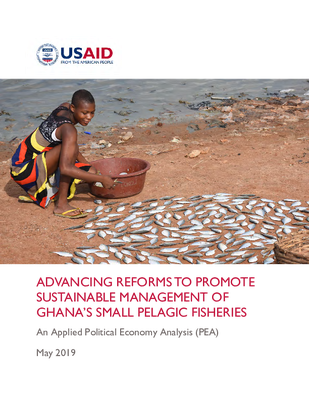Advancing Reforms to Promote Sustainable Management of Ghana's Small Pelagic Fisheries
Ghana is facing a crisis of sustainability in its small pelagic fisheries that threatens the food security and livelihoods of a large segment of the population. While the technical solutions to the problems in these fisheries have been known for some time, the necessary actions have not been implemented. To understand this persistent gap between the presence of solutions on paper and the absence of action in practice, USAID implemented this applied political economy analysis (PEA). The goal of the PEA is to provide a deeper understanding of the political, economic, and social factors driving the behavior of key actors in the fisheries sector to inform future USAID programming decisions.
https://biodiversitylinks.org/projects/completed-projects/bridge/bridge-resources/advancing-reforms-to-promote-sustainable-management-of-ghana2019s-small-pelagic-fisheries/view
https://biodiversitylinks.org/projects/completed-projects/bridge/bridge-resources/advancing-reforms-to-promote-sustainable-management-of-ghana2019s-small-pelagic-fisheries/@@download/image/image.png
File
Advancing Reforms to Promote Sustainable Management of Ghana's Small Pelagic Fisheries
Author(s):
Stark, J., H.Z. Schuttenberg, M. Newton, S. Edminster, G. Asiedu. E. Ekekpi., and G.J. Torrens-Spence
Publication Date: 2019
DOWNLOAD FILE
Ghana is facing a crisis of sustainability in its small pelagic fisheries that threatens the food security and livelihoods of a large segment of the population. While the technical solutions to the problems in these fisheries have been known for some time, the necessary actions have not been implemented. To understand this persistent gap between the presence of solutions on paper and the absence of action in practice, USAID implemented this applied political economy analysis (PEA). The goal of the PEA is to provide a deeper understanding of the political, economic, and social factors driving the behavior of key actors in the fisheries sector to inform future USAID programming decisions.



